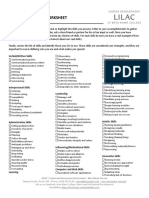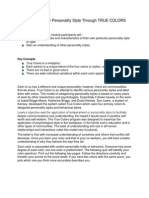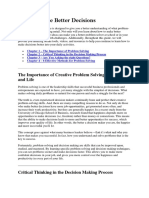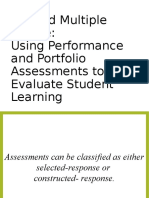2 Personality Development
2 Personality Development
Uploaded by
Hakdog CheeseCopyright:
Available Formats
2 Personality Development
2 Personality Development
Uploaded by
Hakdog CheeseOriginal Title
Copyright
Available Formats
Share this document
Did you find this document useful?
Is this content inappropriate?
Copyright:
Available Formats
2 Personality Development
2 Personality Development
Uploaded by
Hakdog CheeseCopyright:
Available Formats
ROTC MS 2: MILITARY CHARACTER DEVELOPMENT MODULE
PERSONALITY DEVELOPMENT
OBJECTIVES:
At the end of this module, you will be able to:
1. Understand the values for self-development; and
2. Understand the personal development goals that will aid and augment the personal growth journey into
a happier more confident person.
PERSONALITY DEVELOPMENT
Self Development is taking steps to better you, such as by learning new skills or
overcoming bad habits. An example of self development is taking courses at the university to
learn new skills and interesting things.
The journey of self-improvement is an ongoing process of constant learning. It gives you the
opportunity to evaluate your strengths and weaknesses and to work on them. The benefits
are that you grow as a person while growing your skills, you improve your self-awareness,
and you boost your confidence.
One of the most sane and apt decisions you can make for yourself is to strive towards
continuous self-development.
Some of the things that we all want for ourselves include: enhancing the quality of our lives,
achieving more, becoming better people, and trying to be a better version of ourselves. That’s
why we set personal development goals in our lives.
Listed below are 21 personal development goals example that will aid and augment your
personal growth journey into a happier more confident you:
1. Embrace Empathy. Empathy is about objectively comprehending differing perspective
which in turn provides a wealth of insight into your own perspective.
2. Confidence. Studies have revealed that an individual’s IQ is not the most important
component for success. Instead, the following three factors are considered to be much
more important than intelligence in determining success: self-confidence, goal setting, and
perseverance. And individual’s self esteem, or your self-confidence, is basically what s/he
thinks about himself or herself. One of the reasons for boosting your self-confidence is that
there is a strong association between confidence and success. Hence, one of your self-
development goals should definitely boost your self-confidence.
3. Listen Actively. Actively learn to pay attention and demonstrate to others that you truly
value their opinions and what they have to say. Choose active listening, open-ended
question, with supporting body language, and remove any distractions that impede with
your ability to listen.
4. Make fear your friend. To eliminate fear, you have to first be exposed to fear allow
yourself to feel afraid and expose yourself to it. Once you are comfortable with the
ambiguity and uncertainly of the situation, you can start working your way through it in a
calm rational manner.
5. Improve your body language. Your body language is nothing but non-verbal
communication which includes the gestures and movements you project. Research has
proved that the correct body language can help you connect effectively with others and
convey your message across more efficiently. It conveys your assertiveness, confidence,
PERSONALITY DEVELOPMENT 1|P age
and perseverance. In fact, certain body postures can also help to improve your
performance.
6. Get along with others. You must always look for means to create rapport with others.
However, you need to be honest and your primary objective should not be to manipulate
others, rather you should learn the ways through which you can relate and get along well
with others.
7. Get along with yourself. Getting along with your self is a precursor to getting along with
others. You must learn to appreciate and accept your skills, experience, philosophies,
aspirations, and limitations. This healthy focus and more grounded you, is inspirational
and charismatic.
8. Stop procrastinating. You need to understand that procrastination is not a character trait,
but rather a habit. Since it is a habit, it is 100% possible for you to unlearn it just as you
have learnt the habit. Strive to utilize time is the most effective manner and avoid
procrastination by all means.
9. Wake up Early. Develop the habit to get up early. The age old proverb which says: “Early
to bed and early to rise makes a man healthy, wealthy, and wise!” has been coined owing
to the multiple benefits of an early riser. Some of these include: watching and enjoying the
sun rise, do some early morning exercise for your fitness, being able to work on a project
just because it’s important to you before the day officially gets started, and so on. In
addition, studies show that early rises are happier, healthier, and more productive than
their late rising counterparts.
10. Become more proactive. Inculcate the habit of pro-activeness. Some of the traits of
proactive people are :
- They consider themselves to be the creators of their lives.
- They don’t consider themselves to be victims of external conditions.
- They don’t allow other to determine their fate.
- The take ownership of the responsibility for the results they get.
11. Master the art of conflict resolution. Conflict is a part and parcel of life. The key is to
develop the skill of conflict resolution. If you posses the ability to resolve conflicts
rationally and settle disputes amicably, it will certainly make more successful and happy.
12. Let go of the past. One of the biggest hindrances to personal growth is holding on to the
past. In order to be happy in the true sense of the term, it is very important to be in the
present. So, you must learn to release the ghosts of the past and clear skeletons from
the cupboard.
13. Read more. Read often. Nothing is more powerful than the treasure of knowledge and
the way to acquire this treasure is to read as much as you can. Research has proved that
acquiring new knowledge satisfies an individual’s thirst for competence, which makes
them eventually happier. You must develop the habit of reading books that will help you
to acquire new skills and as well as to polish your existing skills.
14. Become more resilient. Resilience is the innate ability to overcome and kind of
adversity. It is the difference between feeling helpless and facing your problems
confidently and bravely. You must always learn how to bounce back from any kind of
problem; it will only help you to emerge as a stronger individuals.
15. Manage stress effectively. Too much stress can land you up in distress. It impacts not
your physical health but also your mental and emotional health. You must know how to
effectively manage stress. There are a lot of stress management techniques available
these days. So all you need to develop is the willingness to fight stress. Finding the
means to tackle stress is not a challenge these days with help available at the click of a
mouse.
16. Ignore your limitations. Limiting beliefs hinders your progress by keeping you caught
up in your comfort zone and prevents you from trying out new things and stops you from
tacking risks for the fear of failure or getting hurt in the process. You can have limiting
beliefs about almost anything ranging from money, relationship, success, and the list is
PERSONALITY DEVELOPMENT 2|P age
endless. It is important to identify your limiting beliefs, conquer them, and reinstate them
with positive beliefs that enable you to achieve your dreams in life.
17. Share yourself. Become a teacher and share your time, feedback, opinions knowledge
and skills. The transfer of knowledge and skills not only benefits the other person but the
process itself reinforces the neural pathways of what you know taking you closer to
mastery.
18. Increase your willpower. Harboring a strong will power enhances your finances, your
health, your relationship, your professional success, and all other areas of your life.
Irrespective of the goals that you have set for yourself, you need willpower in order to
attain them.
19. Become more mindful. Strive to become more mindful. It helps you to acknowledge the
abundance and the benefits that is already a part of your lives. Instead of spending time
thinking about the past which you have no idea of how it is going to be, you must learn to
live in the present and enjoy the moments.
20. Make better decisions. Develop the habit to make better decisions in life. The choices
or the decisions that you make determines the life that you will eventually lead. Your
decisions share your life, so it’s all the more important that the better decisions you
make, the better your life is likely to be.
21. Work on your growth mindset. Your attitude defines who you are as a person and it
the identification point of the state of your mind. You must constantly work on your
attitude and strive to make it one conducive for growth. A positive mental attitude can
move mountains for you. It helps you to achieve what your want from life.
The above mentioned personal development goals have been listed so that you are able to
life of your dreams by setting achievable personal goals that make you a better person. So,
it’s never too late.
The Secret to Achieving Self-Improvement and a Better Life
1. Choose realistic goals that are meaningful to you.
2. Create an action plan you can follow.
3. Take baby steps.
4. Keep track of your successes.
5. Cultivate optimism.
6. Practice positive-self talk.
7. Be mindful and self-aware of how you sabotage yourself.
VALUES EDUCATION
Value education is the process by which people give moral values to each other, according
to Powney et al. It can be an activity that can take place in any human organization during
which people are assisted by others, who may be older, in a condition experienced to make
explicit our ethics in order to assess the effectiveness of these values and associated
behavior for their own and others' long term well-being, and to reflect on and acquire other
values and behavior which they recognize as being more effective for long term well-being of
self and others. There is a difference between literacy and education.
One definition refers to it as the process that gives young people an initiation into values,
giving knowledge of the rules needed to function in this mode of relating to other people, and
to seek the development in the student a grasp of certain underlying principles, together with
the ability to apply these rules intelligently, and to have the settled disposition to do
so. Some researchers use the concept values education as an umbrella of concepts that
includes moral education and citizenship education. Themes that values education can
address to varying degrees are character, moral development, religious education, spiritual
development, citizenship education, personal development, social development and cultural
development.
PERSONALITY DEVELOPMENT 3|P age
Moral education
Morals as socio-legal-religious norms are supposed to help people behave responsibly.
However, not all morals lead to responsible behavior. Values education can show which
morals are "bad" morals and which are "good". The change in behavior comes from
confusing questions about right and wrong.
Character education
Character education is an umbrella term generally used to describe the teaching of children
in a manner that will help them develop as personal and social beings. However, this
definition requires research to explain what is meant by "personal and social being."
Concepts that fall under this term include social and emotional learning, moral
reasoning/cognitive development, life skills education, health education; violence prevention,
critical thinking, ethical reasoning, and conflict resolution and mediation.
FORCES THAT SHAPE CONTEMPORARY VALUES
The Filipinos of the last quarter of the 20th century are the sum total of the social strains
and cultural elements that are Aeta, Indonesian, Malaysian, Hindu, Arabian, Chinese,
Spanish, and Americans. In short, the Filipinos are cosmopolitan in nature. They are both
oriental and occidental.
The compadre system initiated the Filipino into the practice of extended families and this
has served to strengthen the notorious practice of nepotism and favouritism in the social
spheres.
The Americanization of the Filipino consisted of the introduction of a democratic system
of government.
The most significant among contemporary efforts to influence the Filipino values system
perhaps comes from the Department of Education and Sports, which in 1988 launched a
comprehensive Values Education Program.
Filipinos have displayed remarkable adaptability, resulting in a many-sided “cultural
heritage,” for whatever elements in Filipino culture were borrowed have been Filipinized
and in the process had become distinctly Filipino.
Non-rationalism and Rationalism:
- The philosophy of life implied in non-rationalism revolves around the area that man
has to adopt himself to nature and to forces outside of himself. Non-rationalism
involves an uncritical acceptance, reverence and protection of tradition and rituals.
There is a resistance to scientific methods, an unswerving loyalty to the group and
unquestioning obedience to authority.
- Rationalism, on the other hand, involves a belief that by systematic planning, studying
and training, one can actively control and manipulate his or her destiny; one is thus
greatly responsible for his or her own success or failure.
- Filipinos have been influenced by western rationalism although they are still
fundamental non-rational.
The “bahala na” mentality has also led to lack of punctuality, vulnerability to awa,
dependence on the espiritista, the “mangkukulam” or witch.
Other Filipino expressions of these orientalism are found in the phrases such as,
“itinalaga ng Diyos,” “igunit ng tadhana,” “gulong ng palad” (life has its ups and downs or
life is like a wheel of fortune), “malas” (bad luck), and “napasubo” (forced into something).
Filipinos are also shame-oriented.
“Amor propio” is high self-esteem and is shown in the sensitivity of a person to hurt
feelings and insults, real or imagined.
Personalism attaches major importance to major factor which guarantees intimacy,
warmth or security of kinship, and friendship in getting things done.
PERSONALITY DEVELOPMENT 4|P age
Impersonalism refers to the tendency to eliminate the influence of friendship or kinship in
working situations
Particularism and universalism: Where a person’s concerned is centered on sub-groups
made up of relatives, friends, colleagues, associates, religious affiliates, or members of
his/her ethnic regional group in the larger society to which s/he belongs, that individual is
particularistic. When one’s main concern is the advancement of the collective or national
good, s/he is universalistic.
Nationalism is the advocacy of making one’s own nation distinct and separate from others
in intellectual, cultural, social, economic, political, and moral matters.
Nationalism can be a factor for either evil or good. If carried to its extreme, it may take the
form of ethnocentrism, or racism, or xenophobia.
THEORIES OF VALUES FORMATION
Types of Values
Universal Values: It has the same value or worth for all, or almost all people.
Eg. Sanctity of human life, Peace, and human dignity.
Instrumental values: These are values that can be used to get something else.
Examples of these would include Progress (which allows leisure time), Freedom
(Through which we can get dignity and/or self actualization), and Knowledge
(which helps us to get economic prosperity, and progress).
Intrinsic Values: (opposite to instrumental value) Something has intrinsic worth
simply because of what it is, and not necessarily what it will lead to.
For example: beauty, artistic expression and happiness. We value them because
they are an important aspect of life.
Prerequisite Values: These are values that are necessary before you can get to
some bigger goal.
Examples of this type of value include safety (which is needed before people can
even think about having anything else), Justice (which is needed before we can
move onto equality), or the common good (which must be honored if we can ever
get to a state of peace).
Paramount Values: It is the value which is above all other things.
For example: freedom (which many people have given up their lives for and see
as essential to a decent life).
Operative values: These types of values are the ways that we make judgements
on how to live the rest of our lives. We use these values s the overarching and
guiding principles which tell us what is always right and wrong.
For example: integrity, honesty and loyalty
Other many sources of Values
The Individual Conscience
- Family
- Friends
- Fellow Workers
- The Law
- Religious Beliefs
PERSONALITY DEVELOPMENT 5|P age
- Profession
- Employer
- Society at Large
Moral Principles or Values
Trustworthiness
- Work with little supervision, yet seek guidance as needed.
- Be honest, reliable and ethical in all dealings
- Refuse to steal, misuse or abuse company time, property or equipment
- Refuse to lie, cheat, deceive, manipulate, exploit or take advantage of others.
Respect
- Value and honor all people
- Respect the dignity, privacy and freedom of all
- Use good manners. Be courteous and polite
- Listen to and communicate openly with others
- Be friendly and cooperative
Responsibility
- Show initiative. Pay attention to detail. Pursue excellence
- Be loyal
- Strive to improve abilities, learn new skills and take on broader responsibilities
- Be accountable. Fulfill commitments, persevere and get the job done.
Fairness
- Listen. Know your job. Communicate honestly
- Consider all stakeholders and the possible short and long term consequences of
decisions
- Be free of bias, just, without favoritism or prejudice
- Use tact and courtesy
- Share knowledge, ideas and skills with others
Caring
- Strive for harmonious, mutually beneficial relationships
- Show kindness and sensitivity to the feelings of others
- Express gratitude
- Show personal concern for others
- Take time to help others
- Be kind. Be kind. Be kind.
Citizenship
- Understand and contribute to the organization
- Take care of equipment and resources
- Pursue life-long learning
- Volunteer without expectation of recognition or reward
- Be a role model and mentor to new employees
PERSONALITY DEVELOPMENT 6|P age
ETHICS AND MORAL EDUCATION
Ethics:
- The body of moral principles or values followed by an individual.
- These are your ACTIONS!
- Ethics are a system of moral principles and a branch of philosophy which defines
what is good for individuals and society.
Morals:
- What is right vs. what is wrong.
- Morals are principles and values based on what a person or society believes are
the right, proper or acceptable ways of behaving.
Three Key Branches of Ethics
Descriptive ethics involves describing, characterizing and studying morality
- “What is”
Normative ethics involves supplying and justifying moral systems
- “What should be”
Applied Ethics about “how” moral outcomes can be achieved in specific situations
MORALITY AND OUR CONSCIENCE
Morality is the belief that some behavior is right and acceptable and that other behavior is
wrong. ... standards of morality and justice in society. Synonyms: virtue, justice,
principles, morals More Synonyms of morality.
Only Human Beings Can Act Morally. Another reason for giving stronger preference to the
interests of human beings is that only human beings can act morally. This is considered to
be important because beings that can act morally are required to sacrifice their interests for
the sake of others.
Conscience describes two things – what a person believes is right and how a person
decides what is right. More than just 'gut instinct', our conscience is a 'moral muscle'. By
informing us of our values and principles, it becomes the standard we use to judge whether
or not our actions are ethical.
Through our individual conscience, we become aware of our deeply held moral principles,
we are motivated to act upon them, and we assess our character, our behavior and
ultimately our self against those principles
The moral conscience is a person's judgment about a given action's ordering to man's
ultimate end based on the person's knowledge of the action, its end, and circumstances. ...
It directs human actions so that a person can transcend his animal instincts and human
inclinations.
PERSONALITY DEVELOPMENT 7|P age
Your conscience is the part of your personality that helps you determine between right and
wrong. It is what makes you feel guilty when you do something bad and good when you do
something kind.
Seven Types of Conscience
correct conscience. tells us when something is a good choice or a bad choice and
that this decision is in agreement with what that thing.
erroneous conscience.
certain conscience.
doubtful conscience.
lax conscience.
scrupulous sin.
delicate conscience.
The final level of consciousness is known as the unconscious. This is made up of thoughts,
memories, and primitive/instinctual desires that are buried deep within ourselves, far below
our conscious awareness. Even though we're not aware of their existence, they have a
significant influence on our behaviour.
Prepared By:
1LT MARIA VICTORIA C CAALIM PA (RES)
PERSONALITY DEVELOPMENT 8|P age
You might also like
- Bird Personality Test FreeDocument3 pagesBird Personality Test FreeYeoh SiewchinNo ratings yet
- TLS All WorkoutsDocument14 pagesTLS All WorkoutsBurcu SenolNo ratings yet
- 7 Habits of Effective PeopleDocument4 pages7 Habits of Effective PeopleNor-rahma RegaroNo ratings yet
- Identifying Personal ValuesDocument4 pagesIdentifying Personal Valuesaharish_iitk100% (3)
- Living Into Our Values: Taking Values From BS To BehaviorDocument3 pagesLiving Into Our Values: Taking Values From BS To BehaviorSyed Saad ShahzadNo ratings yet
- Values, Interests and Norms As The Spiritual Basis of PersonalityDocument15 pagesValues, Interests and Norms As The Spiritual Basis of PersonalityLa MayeNo ratings yet
- Skills InventoryDocument2 pagesSkills InventoryDarrrlingNo ratings yet
- Self Actualization AssessmentDocument7 pagesSelf Actualization Assessmentapi-205304816No ratings yet
- Abusive Relationship BrochureDocument1 pageAbusive Relationship Brochureapi-553438116No ratings yet
- Megan Maccutcheon: The Ultimate Self-Esteem Workbook For TeensDocument4 pagesMegan Maccutcheon: The Ultimate Self-Esteem Workbook For TeensRAAGHAVNo ratings yet
- Resilient Leadership - What It Is and Why It Matters in BusinessDocument20 pagesResilient Leadership - What It Is and Why It Matters in BusinessDiana valentina cabrera alvarez100% (1)
- Time Management MistakesDocument4 pagesTime Management MistakesMohamed MoubasherNo ratings yet
- Self Esteem AssessmentDocument2 pagesSelf Esteem AssessmentswathiNo ratings yet
- Psych 162: Personality TestingDocument8 pagesPsych 162: Personality TestingSteffi PerillaNo ratings yet
- Discovering Our Personality Style Through TRUE COLORSDocument3 pagesDiscovering Our Personality Style Through TRUE COLORSmatutina5No ratings yet
- Module 3: Nonspecific Factors in Brief CBT: ObjectivesDocument5 pagesModule 3: Nonspecific Factors in Brief CBT: ObjectivesMaria BagourdiNo ratings yet
- Comm Styles Survey & NotesDocument11 pagesComm Styles Survey & NotesBiran HeNo ratings yet
- What Are Interpersonal SkillsDocument5 pagesWhat Are Interpersonal SkillsvivekbhartikNo ratings yet
- Values ClarificationDocument3 pagesValues ClarificationcrisNo ratings yet
- Personality Temperament Test: Section 1 Section-2 Section-3 Section-4Document3 pagesPersonality Temperament Test: Section 1 Section-2 Section-3 Section-4Maui EquizaNo ratings yet
- Core Competency ReflectionDocument3 pagesCore Competency Reflectionapi-691856229100% (2)
- Exploring Your Color PersonalityDocument8 pagesExploring Your Color PersonalityPixelRamenNo ratings yet
- How To Make Better Decisions: The Importance of Creative Problem Solving in Business and LifeDocument11 pagesHow To Make Better Decisions: The Importance of Creative Problem Solving in Business and LifeNagaPrasannaKumarKakarlamudi100% (1)
- Be S.M.a.R.T. With Your GoalsDocument4 pagesBe S.M.a.R.T. With Your GoalsajismandegarNo ratings yet
- Core Values Assessment LongDocument5 pagesCore Values Assessment LongRoxana-Mihaela BitoleanuNo ratings yet
- Know Yourself To Grow Yourself Handout Test and NotesDocument6 pagesKnow Yourself To Grow Yourself Handout Test and NotesashishabokilNo ratings yet
- Considering Coaching For Yourself and For Your Organization?Document4 pagesConsidering Coaching For Yourself and For Your Organization?hypnobabaNo ratings yet
- Module 11: Behavioral Activation: ObjectivesDocument6 pagesModule 11: Behavioral Activation: ObjectivesMaria BagourdiNo ratings yet
- Resiliency QuizDocument3 pagesResiliency QuizMuhammad Sarip100% (2)
- Core Values List 192 Personal Values Alphabetical Order Horizontal Grey Green Pink Beige SaturdayGiftDocument4 pagesCore Values List 192 Personal Values Alphabetical Order Horizontal Grey Green Pink Beige SaturdayGiftHeleninha CoppolaNo ratings yet
- Interpersonal Skills AssessmentDocument4 pagesInterpersonal Skills AssessmentYtsirc Amarra CristylleNo ratings yet
- Module 4: Case Conceptualization and Treatment Planning: ObjectivesDocument6 pagesModule 4: Case Conceptualization and Treatment Planning: ObjectivesMaria BagourdiNo ratings yet
- Religion VS Spirituality - The Difference Between ThemDocument7 pagesReligion VS Spirituality - The Difference Between Themrainbow. dreamzz100% (1)
- Emotional Intelligence - Session 1 PDFDocument4 pagesEmotional Intelligence - Session 1 PDFAnderson CastroNo ratings yet
- 20 Minute Manager - Managing Time - Clorox Services CompanyDocument6 pages20 Minute Manager - Managing Time - Clorox Services Companymaria pia otarolaNo ratings yet
- 365 Steps To Self Confidence - 59f464d11723ddf6fce419ea PDFDocument8 pages365 Steps To Self Confidence - 59f464d11723ddf6fce419ea PDFbharatarora0106No ratings yet
- Emotional Intelligence QuizDocument1 pageEmotional Intelligence QuizSukriti BabbarNo ratings yet
- Ebk SelfReflectionWorksheet PDFDocument17 pagesEbk SelfReflectionWorksheet PDFPradipta MukherjeeNo ratings yet
- Aladins True Colors Personality Quiz PDFDocument5 pagesAladins True Colors Personality Quiz PDFsherifmayika100% (2)
- Personal Development Plan: A Step-by-Step Guide For Developing, Pursuing, and Achieving Your Spiritual and Career GoalsDocument0 pagesPersonal Development Plan: A Step-by-Step Guide For Developing, Pursuing, and Achieving Your Spiritual and Career GoalsBánh BaoNo ratings yet
- Personal & Professional ValuesDocument5 pagesPersonal & Professional ValuesABHILASH a.k.a RYDER HBKNo ratings yet
- Leadership TrainingDocument47 pagesLeadership TrainingGuruNo ratings yet
- Self DevelopmentDocument21 pagesSelf DevelopmentNovie Jane HontiverosNo ratings yet
- Conflict ManagementDocument25 pagesConflict ManagementSharmashD100% (1)
- Stages of Stress: First Stage: ALARMDocument11 pagesStages of Stress: First Stage: ALARMGino Al Ballano BorinagaNo ratings yet
- Mindfulness Journal DownloadDocument21 pagesMindfulness Journal DownloadJasonNo ratings yet
- Character and Competency Strengths Reflection Paper v2Document8 pagesCharacter and Competency Strengths Reflection Paper v2api-272092642No ratings yet
- Personal Development - Ultimate Guide To Self-Growth (With Cover Page)Document98 pagesPersonal Development - Ultimate Guide To Self-Growth (With Cover Page)samazhrpNo ratings yet
- Motivational Interviewing PPT For ADNEPDocument43 pagesMotivational Interviewing PPT For ADNEPEd LeeNo ratings yet
- Time Management StrategiesDocument8 pagesTime Management StrategiesMAXCDAY MICHAEL -No ratings yet
- Empower YourselfDocument15 pagesEmpower YourselfLakshmish GopalNo ratings yet
- How To Form A Personal PhilosophyDocument9 pagesHow To Form A Personal PhilosophyYoonji Min100% (1)
- ProcrastinationDocument32 pagesProcrastinationvioleta25100% (1)
- Behavioural Competences Self Evaluation: Time ManagementDocument13 pagesBehavioural Competences Self Evaluation: Time ManagementJoey ScofieldNo ratings yet
- Self-Care Assessment WorksheetDocument2 pagesSelf-Care Assessment WorksheetNovilee MartinezNo ratings yet
- Leading and Leadership DevelopmentDocument0 pagesLeading and Leadership DevelopmentSyed Ahmed AliNo ratings yet
- Emotional Intelligence Handouts PDFDocument5 pagesEmotional Intelligence Handouts PDFTeoNicaNo ratings yet
- Self Awareness LectureDocument23 pagesSelf Awareness LectureElizabeth Pangilan100% (1)
- Mind Wellbeing: A Workbook & Manual for Achieving Mental Wellness and Healthy RelationshipsFrom EverandMind Wellbeing: A Workbook & Manual for Achieving Mental Wellness and Healthy RelationshipsNo ratings yet
- Ge0021 2Document21 pagesGe0021 2Hakdog CheeseNo ratings yet
- Credit SystemDocument57 pagesCredit SystemHakdog CheeseNo ratings yet
- Mathematics of BuyingDocument27 pagesMathematics of BuyingHakdog CheeseNo ratings yet
- Lesson 2. 12 Little Things Every Filipino Can Do To Help Our CountryDocument15 pagesLesson 2. 12 Little Things Every Filipino Can Do To Help Our CountryHakdog CheeseNo ratings yet
- Prelims - Basic Concepts of MoneyDocument41 pagesPrelims - Basic Concepts of MoneyHakdog CheeseNo ratings yet
- k12 Evaluation Chem3202 Chem3202 Aug05 KeyDocument16 pagesk12 Evaluation Chem3202 Chem3202 Aug05 KeyHakdog CheeseNo ratings yet
- Pe 1 Course Pack - FitnessDocument76 pagesPe 1 Course Pack - FitnessLOUISE DOROTHY PARAISO100% (4)
- Working at HeightDocument3 pagesWorking at HeightMelanie CortezNo ratings yet
- SANC Competencies Emergency NurseDocument28 pagesSANC Competencies Emergency Nursemakabe.k02121127No ratings yet
- UCLA Loneliness Scale (Version 3) Reliability, Validity, and Factor StructureDocument22 pagesUCLA Loneliness Scale (Version 3) Reliability, Validity, and Factor StructureMarilo Rus GuerreroNo ratings yet
- Attractions and Theme Park Operations: Department of EducationDocument2 pagesAttractions and Theme Park Operations: Department of EducationRemar Fernandez Serrano100% (1)
- Prehospital Index: A Scoring System For Field Triage of Trauma VictimsDocument5 pagesPrehospital Index: A Scoring System For Field Triage of Trauma VictimsNgọc Hà PhạmNo ratings yet
- PME FormDocument2 pagesPME FormManvi DaveNo ratings yet
- CUADERNILLO - INGLÉS 1 - PyPP (3,4,5)Document34 pagesCUADERNILLO - INGLÉS 1 - PyPP (3,4,5)Maria PaulaNo ratings yet
- Australian Regulatory Guidelines Medical DevicesDocument338 pagesAustralian Regulatory Guidelines Medical Devicesniki.skellyNo ratings yet
- CHN Sas 13 18 MCDocument7 pagesCHN Sas 13 18 MCUy Jezrielle MicahNo ratings yet
- Bulletin: IHCP Clarifies Prior Authorization For Certain DME or HME Supplies and ServicesDocument2 pagesBulletin: IHCP Clarifies Prior Authorization For Certain DME or HME Supplies and ServicesIndiana Family to FamilyNo ratings yet
- Jurnal Teklab 2Document4 pagesJurnal Teklab 2Indri ArwandaNo ratings yet
- Community Service ReportDocument6 pagesCommunity Service ReportRahaya TayyabNo ratings yet
- Gec 330 Test 1Document5 pagesGec 330 Test 1DonaldNo ratings yet
- Pneumocystis Jirovecii PneumoniaDocument50 pagesPneumocystis Jirovecii PneumoniaAcin8tobacterNo ratings yet
- Barangay Certification: To Whom It May ConcernDocument1 pageBarangay Certification: To Whom It May Concernsan nicolas 2nd betis guagua pampangaNo ratings yet
- D-37/1, TTC MIDC, Turbhe, Navi Mumbai-400 703Document2 pagesD-37/1, TTC MIDC, Turbhe, Navi Mumbai-400 703prasanjit dashNo ratings yet
- HOSPITAL SAFETY INDEX Form 1 - Final VersionDocument42 pagesHOSPITAL SAFETY INDEX Form 1 - Final VersionCleo Fe TabadaNo ratings yet
- Case: Making Friends at PillcoDocument10 pagesCase: Making Friends at PillcoAnil Varma Datla100% (3)
- Power Breathing Breathe Your Way To Inner Power (2008)Document264 pagesPower Breathing Breathe Your Way To Inner Power (2008)Pk100% (3)
- Assefa Research Proposal 2013Document50 pagesAssefa Research Proposal 2013tsegaw kebede92% (12)
- Leading and Leadership DevelopmentDocument0 pagesLeading and Leadership DevelopmentSyed Ahmed AliNo ratings yet
- The Food Industry: History, Evolution and Current Trends: Department of Business and EconomicsDocument106 pagesThe Food Industry: History, Evolution and Current Trends: Department of Business and EconomicsJay ChenNo ratings yet
- Neuroses: Anxiety DisordersDocument12 pagesNeuroses: Anxiety DisordersHaggai lundaNo ratings yet
- Activity Number-1 Sprouting Class:VI Subject:Science Duration - 2 DayDocument2 pagesActivity Number-1 Sprouting Class:VI Subject:Science Duration - 2 DayGayathriNo ratings yet
- E1 Effective Exam PreparationDocument2 pagesE1 Effective Exam PreparationWendy GuNo ratings yet
- WWW Scribd Com Document 437023289 Polyhydramnios CASE STUDYDocument14 pagesWWW Scribd Com Document 437023289 Polyhydramnios CASE STUDYJv LalparaNo ratings yet
- Exam Program Oct 2023 Fle (Fisheries) - With PRC LogoDocument4 pagesExam Program Oct 2023 Fle (Fisheries) - With PRC LogoNurhana DaudNo ratings yet
- Beyond Multiple Choice: Using Performance and Portfolio Assessments To Evaluate Student LearningDocument41 pagesBeyond Multiple Choice: Using Performance and Portfolio Assessments To Evaluate Student LearningFloravie OnateNo ratings yet






























































































